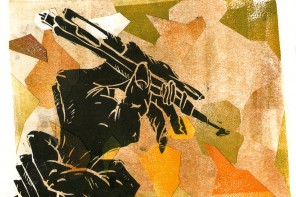From almost joining an insurgent outfit to studying Public Policy Governance at Oxford University, Manjit Nath has come a long way. His inspiring story is now being made into a film, One Last Question. Sensa Nostra catches up with Manjit to talk about his upbringing amidst the continuous violence from an organization that has killed thousands of people in his beloved region, Assam—a state, tucked away in the North Eastern corner of India, most famous for tea and rhinoceroses.
Just when the Assam Agitation by the All Assam Students’ Organisation (AASU) finished, I was born in a beautiful village called Agia in the district of Goalpara, Assam. After the agitation, Assamese people set out on a new quest: to secure independence from the Republic of India.
Agia, my village, was no different from any other typical Indian village during the nineties. I studied in the local government high school. Protests and shutdowns were part of our daily lives. When I was in the tenth grade, we only had twenty-three days of classes during the academic year. With very little access to or contact with the outside world, we weren’t aware of what was happening elsewhere—hence there was no question of complaining. In fact, I was really happy in my small village with family and friends. Thinking of my childhood doesn’t really bring back memories of violence and destitution; rather, my heart fills up with happiness.
The United Liberation Front of Assam (ULFA) took Assam by storm. They were in the forefront of the quest for an independent Assam. There was a euphoria that existed in the state during that period, and it attracted many young minds towards ULFA’s cause. Joining or contributing to ULFA in any manner was seen as a symbol of patriotism. Thousands of young people wanted to join a movement that they could not really understand. And I was one of them.
In the eighties, the Assamese lost faith in the Indian state when the Indian army grossly violated human rights under the cover of the Armed Forces Special Powers Act. Citizens were also upset with discriminatory public policies regarding government jobs, as well as the mismanagement of oil royalties and tea production. During this time of unrest, the national media never really paid Assam any attention, and the rest of the country was completely unaware of the atrocities occurring in Assam.
Under these circumstances, when a young man sees his family and friends leaving their homes to join a cause for the motherland, he naturally has an urge to also join the movement. This might sound divergent now. But, mind you, when you live in this environment 24/7, you begin to envision taking up weapons. You automatically start pondering the positives of such a movement. It’s very wrong.
During the late nineties, ULFA held a massive recruitment drive in my town. It was also the time of secret killings that slaughtered tens of thousands of ULFA men and their family members. These secret killings of Assam are part of the darkest chapter in Assam’s political history.
In my school playground, we had frequent discussions about the ongoing situation in the state. Some of my friends were in contact with a few ULFA informers and recruiters from nearby villages. I understood the internal tensions my friends were going through. We engaged in conversations, but were never able to properly decipher and analyse the potential outcomes of joining this insurgent group. After all, it wasn’t an easy decision to make.
Three of my friends fled home to join the militant group. Our lives had a lack of guidance, our future career path was directionless, and the grim employment scene—few jobs, highly competitive workforce, and lots of corruption—only made the difficult decision to enroll in ULFA more appealing.
I, too, was inspired to join the insurgency. But first, I decided to have a talk with my father.
My father was the headmaster of a local government school. As such, he emphasised the importance of education, even ensuring that every month a portion of his salary was spent on books. Growing up, my siblings and I were blessed to be able to read a lot. While reading news about ULFA, I used to ask my father questions—although never directly, as I was scared of him. He always brought different perspectives to my questions about the movement. Ultimately, he told me:
“If need be, I will sell the house and land to help you study at the best universities in the world, if you get admission. For a lower-middle class family like ours, education is the only way to survive. 90% of Assam is filled with families of our kind. If we have to overcome this status quo, education is the only route.”
My father started a school of his own and devoted his whole life towards the cause of the school. Through fundraising, he elevated it to a senior secondary school status, and he worked there until his death. When I was working at Microsoft, years later, every time I had my father on the phone, he would ask about my higher studies plan. Often, I felt immensely pressured, but now I think that this feeling was nothing but a motivation to go the next phase. On the 1st of June, 2009, I founded a not-for-profit trust in memory of my father. The trust promotes the concept of the home library and primary education. We have now two libraries with over four thousand books and magazines, and have touched the lives of almost 10,000 people in Assam.
* * *
The appeal of joining an insurgent organization arises in part from problems within India’s social structure: poor unemployment benefits, minimum wage, and general care. Whether a more socialist governmental structure would work in India, I don’t know. Nevertheless, I think the biggest problem for rural youth during that time was a lack of information and motivation.
Growing up, I only knew two career options: doctor or engineer. For all other jobs, you had to pay bribes. On top of that, the competition was fierce. So I had a gloomy picture of my prospective employment. On the other hand, joining a military organisation not only gave one instant access to resources, but also cultivated motivation to contribute to a cause. The choice, which looks so difficult initially, becomes easy to make when viewed through these parameters. In fact, people used to say that insurgency was the only industry in Assam during that period.
Every day I feel the need to go back to my homeland. My dream is to make Assam one of the most progressive states of India. In 2011, I was working in Mizoram, another state in the north-east of India. To me, Mizoram is a perfect example of how peace can happen after a lengthy and violent insurgency movement in 1966 that witnessed several Indian Air Force planes bombing their own people. In Assam, keeping law and order under control remains the biggest challenge. I don’t want to blame only the government—the presence of multiple ethnic groups in Assam has created an identity crisis, and this diversity needs to be converted into a harmonious state. To grow as a society, we have a lot to work on.
I have no answer to the question of what happened to ULFA and their movement. Look at the irony: In the 2014 Parliamentary elections, one ULFA cadre, who once took up arms against the government of India, won the election and now sits in the Lower House, the highest symbol of our democracy. Surrendered ULFA militants now run many of the big-scale government contracts in Assam. The other section, under leader Paresh Baruah, are hiding in Bangladesh, Bhutan, and parts of Myanmar, and continue to push for the armed struggle.
This is not a movement anymore. I am not saying that because sovereign Assam is an absurd idea. I am saying it because ULFA is not the organization that can lead Assam to sovereignty.







